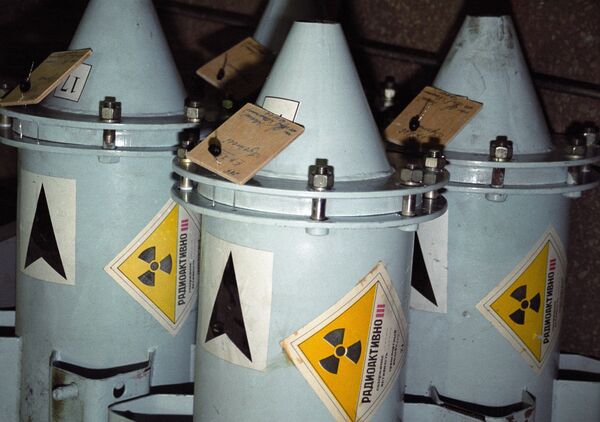This story by Victor Kovalev, corresponding member of Military Science Academy, Strategic Culture Foundation expert, was published in International Affairs magazine.
The international politics is increasingly revolving around the nuclear theme. A meltdown of the regime set by the Nuclear Non-Proliferation Treaty was absolutely predictable. Due to its discriminatory character, the Treaty could not prevent the “horizontal proliferation”, the process which turned Israel, India, Pakistan, N. Korea, and South Africa into nuclear-armed countries. There can be no universally acceptable explanation why some countries are entitled to possess nuclear weapons while others are not.
Asserting its global primacy, the US has dealt several severe blows to the non-proliferation regime.
The first blow was dealt by the US withdrawal from the 1972 missile defense treaty.
The second blow was the adoption of the new nuclear doctrine which set a lower threshold for the use of nuclear arsenals and practically gave them the role of battlefield weapon rather than means of deterrence. The Financial Times wrote recently that Obama's disarmament initiatives are essentially a tactic of countering the Iranian propaganda. Calling for total nuclear disarmament, Washington has reinforced its positions in the intricate game of nuclear diplomacy played out in the UN. Pretending to believe in the possibility of full and global disarmament is an indispensable element of the Western hypocrisy.
The third blow was dealt to the non-proliferation regime by the US when Washington recognized India's de facto status of a nuclear-armed country.
The fourth blow came as NATO and US declared the whole world a zone of their vital interests and increasingly started to rely on force in international politics. It is clear after Yugoslavia, Afghanistan, and Iraq that for the countries regarded as rogue by Washington possessing nuclear arms is the only way of safeguarding themselves against “democratization” backed by cruise missiles and bombers. N. Korea, for example, faced notably fewer threats since withdrawing from the Nuclear Non-Proliferation Treaty.
***
The international politics background at the moment is extremely unfavorable from the standpoint of coordinated anti-proliferation activity.
1. On the one hand, nuclear arsenals are a “superweapon” the use of which would entail catastrophic consequences. On the other, the “superweapon” can serve as a key instrument of pursuing national (or group and particular) interests. We are witnessing two colliding global tendencies as the nuclear disarmament is underway but countries increasingly employ nuclear arsenals to accomplish national objectives.
2. Due to the collapse of the Bretton-Woods system and to the global crisis which erupted in 2008 the US dollar – the main pillar of the US primacy – is sustained solely by the US military potential. The arrangement motivates other countries to become nuclear-armed powers.
3. The raise of Asia over the recent years makes the West worry about the possible mushrooming of nuclear armed countries. The West would be happy to go on exploiting underdeveloped countries and consuming the lion's share of the world's natural resources “unconventionally”, while securing its right to do so with the help of “conventional” warfare in show-like remotely operated and risk-free combat.
4. The widening “geopolitical gap” between the Muslim world and Israel makes the latter rely on its nuclear stockpile as the means of last resort in security affairs. The policy automatically renders the problems of denuclearizing Pakistan and ensuring non-proliferation in the Middle East unsolvable .
***
The “Iranian problem” puts serious obstacles in the way of adopting an internationally coordinated horizontal non-proliferation program. Iran, a Nuclear Non-Proliferation Treaty signatory, is confronted with a kind of “guilt presumption”: it is forced to prove its innocence on various counts. Washington invokes the Iranian nuclear program to justify its support for Israel, and Israel cites Ahmadinejad's militant rhetoric to exact the support from the US, indicating that it can attack Iran's nuclear installations unilaterally.
Iran signed the Nuclear Non-pProliferation Treaty and – with certain limitations – hosted international inspections during which the IAEA discovered no evidence implicating the country. A rational interpretation of the situation should have prompted the West to focus on diplomatic leverage in dealing with Tehran and to make it cooperate in tightening control over the circulation of nuclear materials and know-how.
Instead, the West attempts to corner Iran and perpetually threatens it with sanctions, thus reinforcing the domestic positions of Iranian radicals.
The overall result is that the Nuclear Non-Proliferation Treaty does not work. The agreement is discriminatory, reeks of hypocrisy, and is overloaded with various exceptions from general rules. In the case of the Middle East, the US-British hypocrisy is shocking – to preserve peace it allegedly takes maintaining the nuclear hegemony of Israel, the country that refused to sign the Nuclear non-Proliferation Treaty, and punishing Iran, the country which joined it. In likewise cases, comments are unnecessary.
Playing a risky game on the grand chessboard and meeting with no resistance from Russia, the US led the situation to a zugzwang, a situation where any move creates further problems.
(Views expressed in this article reflect the author's opinion and do not necessarily reflect those of RIA Novosti news agency. RIA Novosti does not vouch for facts and quotes mentioned in the story)



